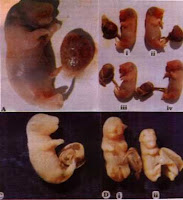 A study done on mice has presented that alcohol-related susceptibility and resistance may be attributed to genetics.
A study done on mice has presented that alcohol-related susceptibility and resistance may be attributed to genetics.
To do the study, the researchers, led by Chris Downing, a research associate at the
The researchers gave the pregnant mice 5.8g/kg of alcohol (or malto-dextrin) on the ninth day of pregnancy which is approximately equivalent to day’s 28-31 of the human gestation period. On the eighteenth day of pregnancy the mice were put down and the foetuses were examined to identify any ‘gross morphological malfunctions’.
It was revealed that one strain of mice had foetal weight deficits. This strain also had malformations of the digits, kidney, brain, ventricle and vertebrae. Another strain, however, showed no obvious evidence of teratogenesis. The three remaining strains all showed varying degrees of teratogenesis.
These results emphasise that genetics does play a role in teratogenesis as the different genetic strains of mice are affected in different ways.
There is the possibility that these results could be extrapolated to human teratogenesis as mice and humans have an astonishingly similar genome, so it is reasonable to suggest that genetics could play a role in human teratogenesis as well.
Article Link:
http://www.sciencedaily.com/releases/2009/04/090422175142.htm
By